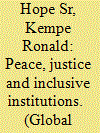| Srl | Item |
| 1 |
ID:
173970


|
|
|
|
|
| Summary/Abstract |
The SDGs are intended to be universal, in the sense of global applicability. Goal 16 of the 2030 Agenda for Sustainable Development is officially titled: ‘Promote peaceful and inclusive societies for sustainable development, provide access to justice for all and build effective, accountable and inclusive institutions at all levels’. This article provides an analysis of the importance of SDG 16 to achieving all of the SDGs, the progress on implementation of SDG 16 to date, the principal challenges that countries are encountering in the implementation of SDG 16, and proposes a set of policy solutions to overcome those challenges. It argues that progress on SDG 16 is critical to progress on the other SDGs and, therefore, it is imperative that countries vigorously attempt to overcome those challenges to meet the targets indicated for each goal. It draws on country experience as well as on the author’s own field experience.
|
|
|
|
|
|
|
|
|
|
|
|
|
|
|
|
| 2 |
ID:
174592


|
|
|
|
|
| Summary/Abstract |
In this paper we empirically reexamine the debate over the conflict reducing properties of inclusive political institutions. We examine the purported violence reducing effects of proportional representation (PR) electoral systems, parliamentarism, and federalism, conditioning their effects on ethnic fractionalization and whether a country is conflict prone. In other words, are these institutions more effective in countries that have already experienced major conflict or are they more effective in preventing conflict in countries that have not experienced major conflict? Using a data set that includes a sample of 81 countries and 2488 observations from 1973 to 2018, we test the conditional effects of proportional representation electoral systems, parliamentarism and federalism conditioning these by ethnicity and whether the country has experienced a major conflict (i.e., civil war). We find that these institutions have little effect on reducing the number of riots or political deaths, but PR electoral systems reduces ethnic violence when ethnic fractionalization is high. On the other hand PR electoral systems and parliamentarism reduce ethnic violence in conflict prone countries, but federalism increases the likelihood of ethnic violence. We discuss the implications of these findings with regard to arguments regarding inclusive power sharing arrangements and violence in post conflict environments.
|
|
|
|
|
|
|
|
|
|
|
|
|
|
|
|